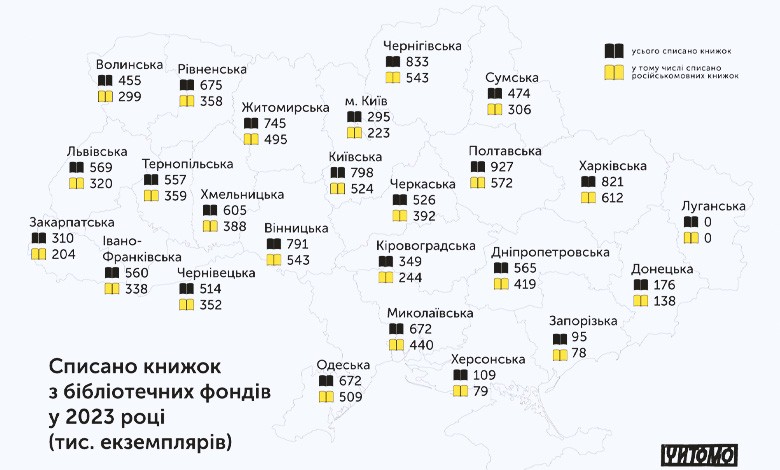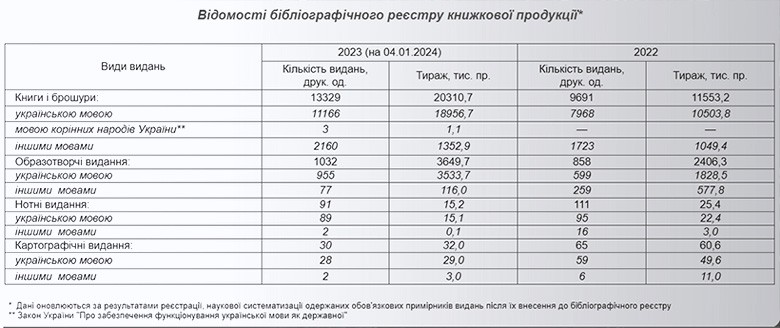Over 26 million books were written off in Ukraine in 2 years: what are they to blame?

The war has been going on in Ukraine for the third year in a row, but the fight against Russian and world literary classics has been going on for even longer. The scale of the destruction (writing off) of books is more revealing than the scale of the destruction of the enemy at the front. And this is understandable – books cannot defend themselves without weapons, and their authors have long been gone.
For information According to Yaroslav the Wise National Library of Ukraine, the Poltava region is the leader in the removal of books – in 2022, 1 million 64 thousand publications were removed from the library collections there, in 2023 – 927 thousand.
The Dnipropetrovsk region is in second place: in 2022, its library funds got rid of 734,000 books, in 2023 – 455,000.
The “prized” third place belongs to Lviv Region – in 2022, 978,000 editions were written there, in 2023 – 568,000.
In 2022 and 2023, 674 and 526 thousand copies were written off in Cherkasy region, respectively, in Ternopil region – 656 and 556 thousand. In Kharkiv region – 309 and 821 thousand copies. At the same time, the number of books written off in Kyiv is much lower – in 2022, 224,000 books were written off, and in 2023 – 295,000, although the funds here are probably larger than similar book repositories in most regions.
Book stocks changed the least in the regions that were or are under temporary Russian occupation: in Luhansk region, no books were written off in 2022 and 2023, in Donetsk region, 75 and 176 thousand copies were written off, respectively. In 2023, 108,000 books were written off in Kherson region, but there are no data for 2022.


In general, in 2022, 12 million 971 thousand books were removed from the libraries of Ukraine, in 2023 – 13 million 165 thousand, that is, in just the last two years – 26 million 136 thousand copies. The number is simply crazy!
It should be noted that of all the books written off in 2022 and 2023, the percentage of Russian-language editions is 66% – 8 million 653 thousand in 2022 and 8 million 795 thousand in 2023. At the same time, the largest number of Russian-language publications was published in the Vinnytsia region: 644,000 in 2022 and 543,000 in 2023.

In this connection, the question arises: how many books are left in library collections after such a global purge? How many Ukrainian-language publications were they filled instead of written off?
According to the official data of the Book Chamber, in 2022 more than 9,000 book titles were published, and their circulation was 11,553,000 copies. At the same time, the number of titles of Ukrainian-language books amounted to almost 8 thousand, 1,723 titles were published in foreign languages (books in the languages of indigenous peoples were not published in 2022). During 2023, 11,166 books and pamphlets in the state language were published in Ukraine (their circulation is almost 19 million (19,000 thousand copies), the rest of the published books are published in the languages of the indigenous peoples of Ukraine and books in foreign languages.
So, a total of 23,020 books were published in Ukraine over the past two years.

The hatred of Ukrainians towards Russia is quite understandable. However, what do Pushkin, Turgenev, Tolstoy and many other writers have to do with this, even remotely? Why are the works of the Ukrainian writer Gogol written off? In addition, what are the classics of world literature from other countries guilty of? Why can’t they be read if there is no Ukrainian translation of their works? The current situation leads to the fact that Ukrainian schoolchildren do not know world literary classics, and adults stop reading them. Whereas in Europe, cultured people know and do not combine the literature of the 18th and 20th centuries with Russia’s large-scale aggression.
In the history of mankind, there were only two cases of destruction of books written in the previous historical period: the first – during the introduction of Christianity, but the pagans practically did not have their own literature, and therefore they could only destroy historical and religious works of art, various attributes of those ancient beliefs. The second case is the actions in Germany in the 1930s, when the new government in the form of the NSDAP (National Socialist German Workers’ Party) in order to instill in Germans a sense of extreme pride for their nation burned books by German authors written earlier, and in which they were often highlighted problems of this people in the period after the First World War, lost by Germany.
During the Second World War, German troops occupied Ukraine for about 3 years, then several million Ukrainians died, but the works of German writers were not banned. The reason for this was the understanding that in their works they did not support the political regime, which logically followed their work. What is wrong with the situation now? Russian writers in their works did not sing praises in honor of the rulers of the empire, and Pushkin, as is known, was shot on the instructions of the tsar. Yes, they described the life of the Russian nobility, but often critically showed the harsh treatment of some master with his servants.
If, instead of removing books from our libraries, works written in Russian were replaced with Ukrainian translations, this could still somehow be understood as an action to spread the use of the state language. Although it would be much more democratic to supplement the book collections of libraries with Ukrainian-language versions of works, without removing those written in Russian.
Russian-speaking citizens are not included in the list of peoples for whom Ukraine should provide funding for their literature and language (according to the UN resolution, we have three minorities: Crimean Tatars, Karaites and Gagauz), but to provide an opportunity to develop culturally by reading books in their native language is quite a civilized approach and it is in line with European values. We should not forget that there are many ethnic Russians living here (some of them are no longer in the first generation) and they are also fighting at the front with the Russian Federation.
As for works translated into Ukrainian, this is absolutely normal practice. We have books by authors from other countries, which we read in our own language. However, during their translation, some losses in content occur – this is a long-known phenomenon. The fact is that a text in another language is not only a translation. Representatives of different nations have a somewhat different mentality, and not all of their thoughts can be translated while preserving 100 percent meaning. For example, Ukrainians do not always understand American humor and vice versa.
The second illustrative example is the difficulty of translating poems. The fact is that in poetry, not only the content is important, but also phonostylistics – the form of its presentation and, even, the sound. Each author has their own original writing style, it is with its help that they convey their feeling, emotions, attitude towards something, or depict with sounds a picture of the event that is mentioned in the poem. In such a case, what can be done with the poetry of Alexander Pushkin, in whose works linguists have counted up to 16 thousand words and among them many dialects. By the way, this indicator of the wealth of the poet’s vocabulary is unique – according to linguists, a literate person with a higher education usually uses in his life from 3 to 5 thousand words, and here there are as many as 16. When translated into Ukrainian, his works lose their individuality and special nature. At the same time, from a political point of view, Pushkin did not write anything bad about Ukraine. This extremely talented poet of African origin, who in his childhood (up to the age of 11) did not even know Russian, but spoke and thought exclusively in French, probably did not have a clear idea of Ukraine and its history. The relationship to Ukrainians in the works of other Russian classics is roughly the same.
During the time of their creativity, outstanding Ukrainian artists had to go to work in the capital of the Russian Empire and write there as it was possible in the languages of censorship. Although both Mykola Gogol and Anton Chekhov were Ukrainians by origin, they had to create for all the inhabitants of the empire, because they were its subjects. In those days, free thoughts were suppressed by the regime for everyone, and for representatives of national minorities – with particular care, because this approach was at the heart of imperial policy.
And in this connection, a legend from the time of ancient Rome should be mentioned. It tells how an old woman, a foreigner at that, came to Emperor Tarquinius the Proud and offered him to buy 9 books from her. She wanted to receive huge sums of money for them. The emperor laughed in response and refused to buy them. Then the old woman burned three of the nine books at once and now offered 6, but for the same price. The ruler decided that she must not be full of sense and did not buy them, after which the woman burned three more books. This frightened Tarquinius and he ordered to pay her for the three remaining books, the same price as for nine. As it turned out later, these were the Sibyl’s prophetic books, and for centuries they helped Roman rulers make wise decisions in all kinds of incredible situations. However, in 405, the usurper of Rome, Stilicho, ordered the destruction of these three books, which had helped many of his predecessors. After that, after 71 years, the Roman Empire fell, because there was nowhere to learn wise advice and save the state.
For several decades, the number of readers of works of fiction has been decreasing, this is, unfortunately, a general trend in the world. Currently, electronic media are taking over, but the volume of texts in them is in most cases equal to the size of an ordinary text message – 2-3 phrases. With the reduction of popular texts, the large volume of people willing to read decreases along with the level of culture among the population – this is an axiom. The decrease in the number of books in libraries inhibits the development of the already low level of culture in modern society. Without books, people have a limited vocabulary, cannot express their thoughts competently, and most importantly – think critically, so they are easy to control. Books contain all historical experience, people without the knowledge gathered in them will not be able to move in the direction of the development of a progressive society.





